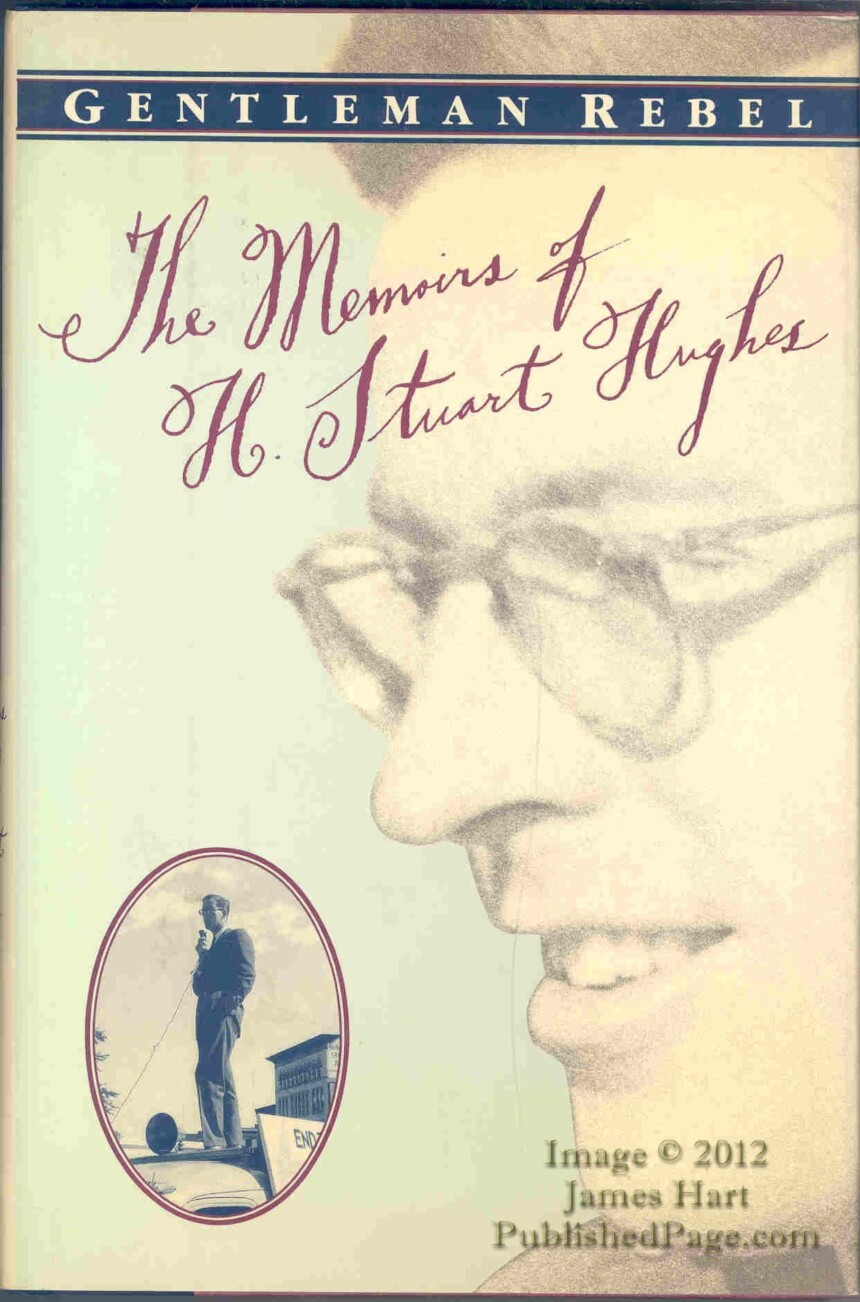To begin on a positive note: anyone who shuddered at the prospect of a barely thirty-something Edward Kennedy in the U.S. Senate cannot be wholly without redeeming social value. The year was 1962, and H. Stuart Hughes, grandson of the 1916 Republican presidential nominee of the same surname and devotee of a SANE foreign policy, offered himself to the voters of Massachusetts as an alternative to an additional dose of Kennedy liberalism. Hughes, of course, lost by an embarrassingly wide margin. All of this and more is chronicled in a memoir that contains embarrassments apolitical.
Henry Adams this author is not. Unlike Adams’, Hughes’ grandfather lost his bid for the presidency. Unlike Adams, Hughes did dirty his hands by seeking elective office on his own. And unlike Adams, Hughes has written a memoir that tells us more than we need to know about the prolonged (and repressed) sexual adolescence of his “unspent” youth. Parental “scruples” regarding sexual matters have apparently “haunted” not only his childhood, but his adulthood as well. From his mother Hughes learned two lessons: avoid playing with one’s “precious organs” and the “wicked prosper, so why try.” A convert to atheism and socialism at the hardly spent age of 16, Hughes at least had the good sense not to try overly hard to make the world over into his unrepressed adolescent vision of the good society.
Spurning family traditions of politics and the law, the youthful Hughes preferred to remain within the cloister of academe. Then came World War II. At Amherst, Hughes had taken the Oxford Pledge. But the fall of France prompted him to vote for Wendell Wilkie and intervention in 1940. Then came the draft. Terrified at the prospect, Hughes soon discovered army life to be surprisingly tolerable.
Actually, Hughes’ wartime experiences make for interesting reading—probably they constituted the high point of his life, though he would no doubt be loathe to admit as much. In fact, this memoir could be advanced as Exhibit A by advocates of compulsory national service. A secret admirer of an “ordered existence,” Hughes “easily adapted” to military service. A “marginal member” of the upper class, he learned what it was like to be a “second class citizen.” Nonetheless, within the military bullying was nonexistent, and one H. Stuart Hughes became “less a prig.”
Impatient to become an officer, Hughes signed on with the OSS. Admiration for the Red Army was immediate and unrestrained, but Hughes insists that he was never “blindly pro-Soviet.” Still, his self-defined wartime mission was to encourage the democratic left and reinvigorate the Popular Front. Nearly a half century after World War II and better than a year after the end of the Cold War, H. Stuart Hughes is still looking to revive the Popular Front.
Fancying himself to be the “only real American social democrat,” Hughes set out to establish himself as a young Henry Adams in early Cold War Washington. Between visits with his aging grandfather (who at 85 ate his hated broccoli, because it had never occurred to him that it was within his power to ban the “offending vegetable” from his plate), Hughes read and reread The Education of Henry Adams, fretted over the decline of the once “sensual city,” and objected to the Cold War policies of an “inadequate” Harry Truman. But the real enemy was less Truman than the “national interest.” Disdainful of this “meaningless” concept, Hughes grew increasingly agitated at the developing prominence within Washington of George F. Kennan, who provided the intellectual undergirding for the Truman-inspired Cold War, and whose 1946 “Long Telegram” was little more than an “intemperate . . . outburst of frustration.”
The same could be said of the second half of this memoir. Though Hughes claims to have discovered happiness in a southern California-based second marriage, he remains an unreconstructed anti-Cold Warrior. In 1991 he thinks what he thought in 1946, specifically that the Cold War was not inevitable and that the United States bears the majority of the blame for its occurrence.
Hughes at least has been consistent. He objected to all of the Truman Cold War initiatives, the Marshall Plan included. In 1948 he did join the Wallace campaign, only to jump ship when the captain refused to jettison his communist support. Nonetheless, Hughes still insists that Wallace was correct to hold out for a “sphere of influence” approach to Soviet-American differences. Had each power only stayed out of the other’s backyard, then each power would have been able to tolerate “substantial dissent” within its own sphere. (Guess which power Hughes accuses of violating his guidelines.) But in effect the United States did concede Central and Eastern Europe to the Soviets, without a noticeable rise in the level of tolerable dissent.
In the world according to H. Stuart Hughes, all of Europe could have been liberated in 1946. That it was not, was primarily the fault of the United States. And when liberation finally did arrive in 1989, Washington, happily, “played no role.” The long sustained American decision to help preserve freedom in Western Europe apparently had nothing to do with the ultimate Revolution of 1989. No doubt the whole of the Cold War was an insanity to one so SANE. As of the publication of this memoir, the world still awaits the liberation of H. Stuart Hughes from shibboleths outworn at the birth of the Cold War in the late 1940’s and believable only to the likes of Hughes himself—including the now senior senator from Massachusetts whom he so ineffectually challenged nearly thirty years ago.
[Gentleman Rebel, by H. Stuart Hughes (New York: Ticknor and Fields) 362 pp., $24.95]

Leave a Reply